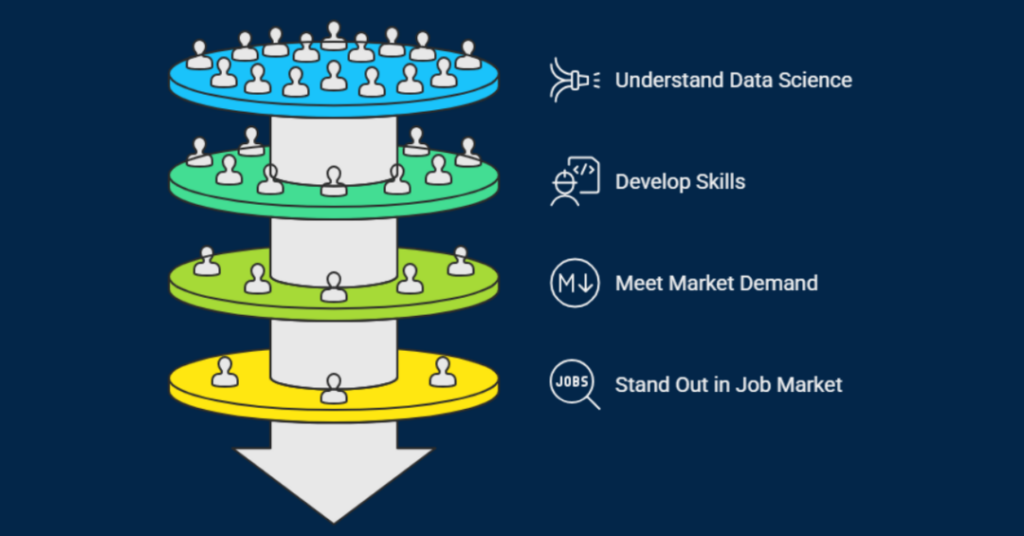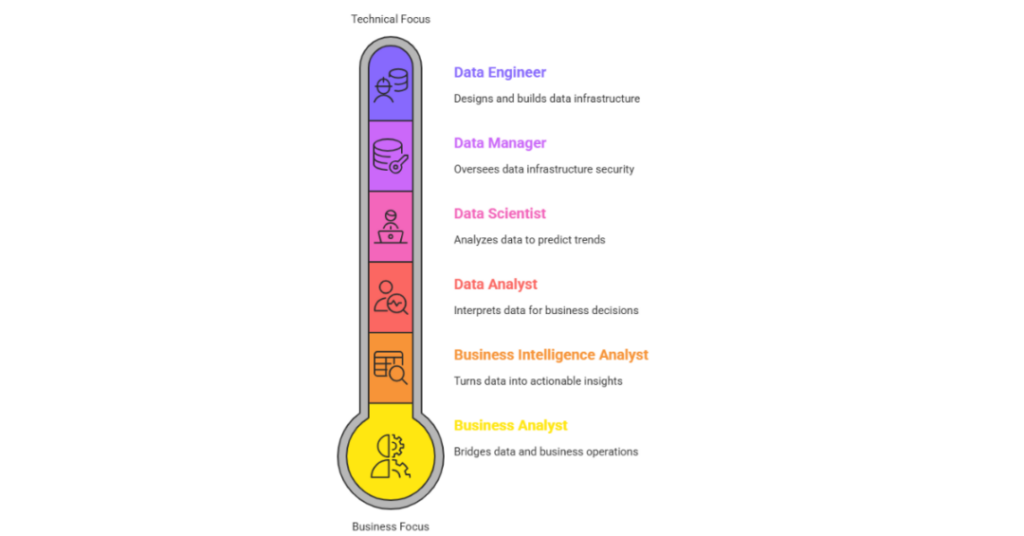27 July 2025
8 minutes read
What Are Some Jobs after MS in Data Science in the USA And Average Salary?

Key Takeaways
- An MS in Data Science opens doors to diverse, high-paying roles like Data Scientist, Analyst, and Engineer.
- The field blends technical skills (programming, stats) with soft skills (communication, problem-solving).
- Hot skills to focus on include machine learning, data viz, big data tech, and data mining.
$129,000. That’s the average annual salary for a qualified data scientist in the U.S. today. Sounds great, right? But here’s the catch — that’s if you make it past the dozens of job rejections, if your resume doesn’t get ghosted by an ATS, and if you didn’t just spend two years mastering Python only to be asked, “Can you build dashboards in Power BI?”
The problem? Everyone’s doing an MS in Data Science, but not everyone’s getting hired. Too many grads, too few relevant skills. Recruiters don’t care about your coursework — they care if you can drive business outcomes, interpret qualified data, and speak the language of business analytics. The good news? There’s a clear path to stand out, land the right job, and actually become a data scientist — and it starts with knowing which roles are hot, what they pay, and how to play your strengths.
What Is Data Science And Should You Pursue It?
Welcome to the era where a degree in Data Science is the new MBA — hyped, expensive, and confusing as hell. Everyone wants to become a data scientist, but few know what data science actually is. It’s not just playing with data — it’s cleaning volumes of data, questioning business data, and translating numerical data into decisions that don’t get people fired. Sounds cool? Sure. But “cool” doesn’t get you a job in the US unless you’re solving complex data problems and not just labeling pie charts as data visualization.

Here’s what most people won’t tell you about this so-called high-growth field of data science:
- Data science is one of the only fields where a junior data analyst with sharp storytelling and data science skills can out-earn a mid-level dev stuck in maintenance.
- The demand for data science isn’t slowing down — job openings have surged by over 480% in the last five years, especially for hybrid roles like business intelligence analyst and senior data analyst.
- Pursue a career in this space only if you’re obsessed with understanding business requirements, not just code — because employers of data want thinkers, not tool-pushers.
- Jobs in the US market for data are competitive, and companies expect you to know not just data collection and analysis, but also data warehousing, data modeling, and data infrastructure.
- Getting a job after your master’s degree in data science won’t be magic — your resume has to scream “skilled and qualified data science professional,” not just “studied from top US universities.”
Why Pursue an MS in Data Science?
An MS in Data Science has grown to be one of the most in-demand degrees in today’s data-driven society. The program provides a comprehensive understanding of the theories and applications of data science and grooms students to handle large volumes of data, apply analytical skills, and extract valuable business insights. Here’s why MS in Data Science can be a great choice:
Curriculum Structure
The curriculum for a Master’s in data science is designed to balance challenging academic study with real-world application. In general, core courses cover fundamental subjects including statistics, probability, linear algebra, machine learning, and programming. Big data analysis, predictive modelling, natural language processing, and deep learning are just a few of the specific topics covered in advanced courses.
Advanced Topics
A significant portion of the program is dedicated to project work. These assignments give students the chance to put their theoretical understanding to use in solving practical issues. They are frequently completed in partnership with business partners, offering students beneficial industry exposure. Projects may involve designing machine learning models, conducting statistical analyses, or developing data visualization tools.
Skill Development
The degree emphasizes the development of soft skills like problem-solving, effective communication, and teamwork in addition to technical competence. The completion of group projects, attendance at seminars, and participation in debates are all encouraged. This holistic education approach prepares students to thrive in collaborative, multidisciplinary work environments.
Career Prospects
An MS in Data Science can significantly enhance your career prospects. Employers value the combination of theoretical understanding and practical experience that a degree in Data Science provides. As such, an MS in Data Science can be a crucial stepping stone to a lucrative career in this rapidly growing field.
What Are Some Job Profiles in Data Science?
After obtaining an MS in Data Science, a multitude of job roles become accessible, each offering unique challenges and opportunities. Here’s a look at some popular job profiles in data science.

Here are a few:
Data Scientist
Data Scientists lie at the core of the data science field. They are responsible for analyzing and interpreting complex datasets to draw meaningful insights. They employ statistical models and machine learning techniques to predict patterns and trends. In addition to data analysis, a Data Scientist may also be involved in collecting and cleaning data.
Data Analyst
Data Analysts play a vital role in organizations by interpreting numerical data to help make informed business decisions. They are tasked with collecting, cleaning, and using statistical methods to analyze data. Their analysis aids in understanding business performance, identifying trends, and making future projections.
Data Engineer
Data Engineers work behind the scenes to design, build, and manage a company’s data infrastructure. They develop algorithms to extract data, implement data solutions, and ensure the systems can handle the data requirements of the organization.
Business Analyst
A Business Analyst bridges the gap between data and business operations. They leverage data to understand business requirements and improve a company’s business model. By applying their skills in data analytics, they aid in process improvement and strategic planning.
Data Manager
Data Managers are the gatekeepers of an organization’s data. They oversee data collection, storage, and retrieval. Their main task is to ensure that the data infrastructure is secure, reliable, and accessible to other data professionals.
Business Intelligence Analyst
Business Intelligence Analysts use data to aid in business improvement processes. They turn raw data into actionable insights and often work closely with management to drive changes.
Top 15 Universities To Pursue MS In Data Science In USA
As the field of data science continues to grow and evolve, many aspiring professionals are seeking advanced education to gain a competitive edge in this dynamic industry. For those considering a Master’s degree in Data Science in the United States, selecting the right university is crucial. The following table presents a comprehensive overview of the top 15 universities offering MS programs in Data Science.
Always check with the universities directly for the most up-to-date information.
| University | Average Fees (per year) | Average Salary (post-graduation) | QS Ranking |
|---|---|---|---|
| Stanford University | $55,000 | $125,000 | 3 |
| Massachusetts Institute of Technology (MIT) | $53,000 | $120,000 | 1 |
| Harvard University | $51,000 | $122,000 | 5 |
| University of California, Berkeley | $43,000 (in-state), $55,000 (out-of-state) | $118,000 | 27 |
| Carnegie Mellon University | $45,000 | $115,000 | 52 |
| Columbia University | $52,000 | $117,000 | 19 |
| University of Washington | $35,000 (in-state), $50,000 (out-of-state) | $110,000 | 85 |
| University of Michigan – Ann Arbor | $45,000 (in-state), $55,000 (out-of-state) | $105,000 | 25 |
| New York University (NYU) | $50,000 | $112,000 | 39 |
| University of Illinois at Urbana-Champaign | $40,000 (in-state), $52,000 (out-of-state) | $108,000 | 85 |
| University of California, Los Angeles (UCLA) | $42,000 (in-state), $54,000 (out-of-state) | $110,000 | 40 |
| University of Pennsylvania | $53,000 | $115,000 | 13 |
| Georgia Institute of Technology | $30,000 (in-state), $45,000 (out-of-state) | $105,000 | 88 |
| University of Texas at Austin | $35,000 (in-state), $48,000 (out-of-state) | $103,000 | 72 |
| Duke University | $54,000 | $113,000 | 42 |
What Is The Salary and Career Growth After Data Science In The USA?
The demand for data science specialists has been steadily increasing as data continues to be the primary factor in business decision-making across the globe. Impressive wages and great chances for career advancement come along with this demand.
The function, years of experience, place of employment, and industry in which a data professional works all have a significant effect in determining their pay in the USA. The top-paying positions in the IT industry are in the data science field. In the US, a Data Scientist can expect to make an average yearly pay of around $113,000, according to Glassdoor. This is only an average, though. Pay for data scientists that are highly talented and experienced might be far above $150,000.
The annual average salary for a Data Analyst in the US is around $67,000. This figure can go higher depending on the level of expertise and the specific industry. Business intelligence analysts can anticipate making about $79,000 per year, whereas data engineers typically make over $102,000 annually.
While these numbers offer a glimpse into the financial rewards of a data science career, they don’t paint the whole picture. Career growth in data science isn’t merely about salary. It’s also about the opportunity to work on exciting projects, makes significant impacts on business decisions and strategy, and continuously learn and grow professionally.
Trending Skills in Data Science
In the rapidly evolving field of data science, certain skills are particularly sought after by employers. Let’s delve into some of these in-demand skills:
Machine Learning:
Knowledge of machine learning algorithms is essential for data science roles, particularly for Data Scientists and Machine Learning Engineers. As businesses continue to implement predictive models, this skill will remain in high demand.
Data Visualization
Turning numbers into pictures isn’t just about making things look pretty. It’s about telling a story. The best visualizations make complex ideas click instantly. They’re your secret weapon in meetings, helping decision-makers grasp key insights at a glance. Don’t just learn the tools – focus on understanding how people perceive information. That’s the real art.
Big Data
Big data isn’t just about size – it’s about speed and variety too. Imagine trying to drink from a fire hose. That’s big data. Tools like Hadoop and Spark help you manage that flood of information. But here’s the thing: it’s not enough to just process data. The real skill is knowing which questions to ask of it. That’s where you can really shine.
Data Warehousing
Think of a data warehouse as a library for your organization’s information. It’s not just about storage – it’s about organization and accessibility. A well-designed warehouse can turn data chaos into clarity. It’s the foundation that makes advanced analytics possible. If you can master this, you’ll be the best data architect of any team.
Data Mining
Data mining is like being a detective. You’re looking for clues hidden in mountains of information. The trick isn’t just finding patterns – it’s finding the ones that matter. It’s about asking the right questions and knowing which leads to follow. This skill can uncover insights that transform businesses. It’s where the real “aha!” moments happen.
How To Prepare For A Career in Data Science?
Starting a career in data science can be a fruitful decision, but it also requires careful planning and preparation. It begins with a solid educational foundation. An MS in Data Science from reputable US universities can equip you with the necessary theoretical knowledge and practical skills.
Educational Foundation
Education is just one piece of the puzzle. Building a successful career in data science also requires developing hands-on experience, cultivating in-demand skills, and staying abreast of industry trends. Taking on internships, working on projects, participating in data science competitions, or contributing to open-source projects can help in gaining practical experience.
Developing In-Demand Skills
Skills in programming languages such as Python and R, proficiency in SQL, and experience with data visualization tools like Tableau or PowerBI are almost always necessary. Knowledge of machine learning, big data technologies, and data warehousing can give you an edge.
Networking and Professional Connections
Networking is also a valuable component of career preparation. Attending industry events, participating in online forums, and connecting with industry professionals can open doors to opportunities. Additionally, soft skills like communication, problem-solving, and adaptability play a crucial role in career progression.
Continuous Learning
Lastly, remember that learning in data science never stops. The field is continually evolving, and professionals must stay ahead by learning new tools, techniques, and best practices. With the right preparation and mindset, a rewarding career in data science is within reach.
Conclusion
The demand for skilled data science professionals across industries shows no signs of slowing down. Businesses are increasingly reliant on data to make informed decisions, optimize operations, and forecast trends. An MS in Data Science can prepare you for this high-growth field and open doors to numerous job roles in the industry.
With data at the core of innovation and strategic decision-making, a career in data science promises not just good salaries but also job security and career growth. Whether your interest lies in technical roles like data engineering or more strategic roles like business analysis, the field of data science has a place for you.
As we look toward the future, one thing is certain: data science is not a passing trend. It’s a field that’s here to stay. So, if you’re considering a career in data science, there’s no better time than now to take the plunge..
Transform your educational dreams into reality by finding scholarships with Ambitio. Our Scholarship Finder Tool is designed to connect you with financial resources that enable you to pursue your academic ambitions without compromise.
FAQs
What are the best entry-level data science jobs?
Positions like Data Analyst, Junior Data Scientist, and Business Intelligence Analyst are great entry points.
Is a Master’s degree crucial for a data science career?
A Master’s degree is beneficial but not mandatory; practical experience and skills are also highly valued.
Can I switch to data science from a different field?
Yes, with focused learning in data science skills and tools, transitioning from other fields is possible.
What does the future hold for data science careers?
The demand is growing, especially with the rise of AI and machine learning, signaling a promising future.
How can I keep up with data science trends?
Follow journals, attend industry events, and engage with online communities and continuous learning.

You can study at top universities worldwide!
Get expert tips and tricks to get into top universities with a free expert session.
Book Your Free 30-Minute Session Now! Book a call now




























